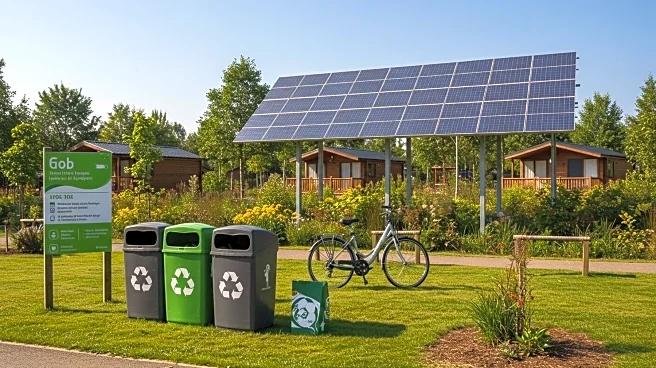What's Happening?
Holiday parks in the UK are increasingly adopting sustainable practices to attract visitors and reduce operational costs. According to a survey by the UK Caravan & Camping Alliance, many operators are implementing initiatives such as recycling, energy and water conservation, and support for local wildlife. These efforts are aimed at reducing environmental impact and improving the bottom line. The survey found that 97% of operators encourage recycling, while 95% focus on energy and water conservation. Additionally, 83% support local wildlife, and 78% participate in green award schemes. Larger parks are investing in renewable energy, with 44% installing solar panels and 59% offering electric vehicle charging points. These measures not only reduce energy consumption but also enhance the appeal of holiday parks to environmentally conscious visitors.
Why It's Important?
The shift towards sustainability in holiday parks is significant for both environmental and economic reasons. By reducing energy and resource consumption, operators can lower costs and improve profitability. This is particularly important in times of economic uncertainty, as domestic holiday parks offer a more affordable option compared to international travel. The adoption of sustainable practices also aligns with growing consumer demand for environmentally friendly holidays. As more visitors prioritize sustainability, parks that demonstrate efforts to reduce their environmental impact are likely to attract more customers. Furthermore, the move towards renewable energy and sustainable practices can future-proof assets against climate-related risks and regulatory changes, making them more appealing to investors.
What's Next?
As sustainability becomes a key factor in holiday park operations, more operators are expected to adopt these practices. The UK government’s commitment to reducing carbon emissions by 81% by 2035 suggests that sustainability regulations will increase, prompting parks to proactively measure their carbon footprint and identify climate-related risks. Operators may also explore biodiversity enhancement initiatives to improve customer attraction. Investment in renewable energy and sustainability-linked financing, such as green bonds, could become more prevalent as stakeholders push for improved sustainability credentials. This trend is likely to continue as the industry evolves, with operators seeking to enhance competitiveness and reduce environmental impact.
Beyond the Headlines
The adoption of sustainable practices in holiday parks has broader implications for the industry. It highlights the growing importance of environmental stewardship and the need for operators to align with consumer expectations. As sustainability becomes a key differentiator, parks that invest in long-term initiatives may gain a competitive edge. The focus on reducing carbon emissions and enhancing biodiversity also reflects a shift towards more responsible tourism, which could influence other sectors within the hospitality industry. Additionally, the emphasis on sustainability may drive innovation in park design and operations, leading to new business models and opportunities for growth.










